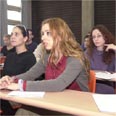

(Editor: See the note at the bottom of article for information about other university students can comment on this issue.)
Universities are touted as bastions of free discourse, where students and faculty debate and exchange viewpoints freely in the marketplace of ideas. Although this may be the ideal, at Columbia University in New York City, where anti-Israel faculty have created an intimidating and hostile environment, the reality is very different.
For example, Professor Joseph Massad reportedly refused to answer an Israeli student's question, instead demanding that the student answer, "How many Palestinians have you killed?"
I personally witnessed this same Professor Massad, in his course titled, "Palestinian-Israeli Politics and Societies," shout at a student in front of the whole class and demand that she leave the room immediately if she was going to "deny Israeli atrocities against the Palestinians."
Such was his response after the student challenged Massad's retelling of the supposed "massacre" in Jenin.
At Columbia for education
Massad taught that there is no archeological evidence to support an historic Jewish presence in Israel, and that Israelis were the ones who orchestrated the infamous massacre of the Israeli athletes at the 1972 Munich Olympics.
Pro-Israel students can deal with a professor who espouses conspiracy theories. After all, this is not a matter of ideology; we highly value the classes that expose us to new perspectives about the Arab-Israeli conflict, and force us to question our views on Israel.
This is precisely why we are at Columbia - for an education.
We thrive on debate, asking only that it take place without threat of ridicule and intimidation. But stifling the debate by demanding a student leave the classroom is anti-intellectual and has no place in academic discourse.
Lest one think this issue revolves around Massad alone, others in Columbia's Middle East and Asian Languages and Culture department are also guilty of intimidation.
Green eyes? Not a Semite
Professor George Saliba told a former student of his she has no claim to the land of Israel because she has green eyes, and so is "not a Semite."
Former department chairman Hamid Dabashi has written in the Egyptian newspaper ”Al-Ahram:” "What they call Israel is no mere military state. A subsumed militarism, a systemic mendacity with an ingrained violence constitutional to the very fusion of its fabric, has penetrated the deepest corners of what these people have to call their soul."
When former Jewish chaplain, Rabbi Charles Sheer, criticized Dabashi for canceling his class so students could attend a Palestinian rally, Dabashi responded that Sheer had "launched a campaign of terror and disinformation reminiscent of the Spanish Inquisition."
These incidents of professorial abuse, along with other occurrences demonstrating the antagonistic atmosphere in which the Middle East is discussed on Columbia's campus, are related in “Columbia Unbecoming,” a recent film produced by the David Project.
Grievances went unanswered
While originally intended to remain internal and to be screened only to members of Columbia University's administration, the video has since gone public and has been viewed by audiences in America and in Israel.
Before turning to an outside organization for assistance, however, students with grievances first used every means available to them to solve the problem within the system.
For example, many students with complaints had first tried addressing the professors directly. When that did not work, students went to deans and department chairmen, who sometimes deflected the criticism of the professors involved and instead placed the blame on the students themselves for what happened in the classroom.
Some of those department chairmen are themselves the objects of the students' grievances.
Other students have attempted to lodge formal complaints with the ombudsman’s office, the provost, and with Columbia President Lee Bollinger himself.
Despite their best efforts to work within the existing system, pro-Israel students were not able to register any official grievances against the professors, and were similarly unable to convince the university administration to take their complaints seriously.
To be clear, the highest levels of Columbia's administration have known for a long time about these grievances. However, it was only after the release of “Columbia Unbecoming” that the administration has, finally, decided to take concrete action.
In a positive step, the administration has acknowledged that Columbia's grievance procedures have been grossly inadequate, and they have undertaken to make the system more user-friendly.
To address our actual claims, however, the administration has created a committee that seems less than appropriate for dealing with these accusations.
Is committee stacked against students?
The committee comprises five members, and is headed by First Amendment scholar Floyd Abrams. Of the others, two signed an anti-Israel divestment petition, one was Massad's dissertation adviser, one has written that Israel is responsible for global anti-Semitism, and one is a university administrator who ignored student complaints for months.
The man who handpicked the committee, Nicholas Dirks, is married to a professor who co-teaches a class with Massad.
The faculty committee's report will not be ready until some time in March at the earliest. The fact that the committee will only make part of its findings open to the public does not inspire me with confidence.
Should they find no evidence of professorial intimidation, President Bollinger will have yet another embarrassing mess to deal with.
Editor’s note: Noah and other students at Columbia said they have been hearing similar stories of intimidation and one-sidedness from students at other North American universities since the release of “Columbia Unbecoming.” We would like to hear your story about what is going on in the Middle East or Asian studies departments at your university, whether it is in the U.S., Canada, U.K., or even in Israel. Write to us at news@ynetnews.com or send us material via Red Email. We’ll post the most interesting comments online.















